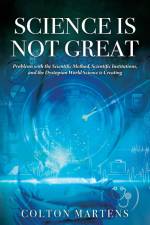- How Pathogens Regulate the Behavior and General Quality of Human Populations
av Colton Martens
275,-
Lifestyle influences infectious disease: This book examines the relationship between lifestyle and infectious disease. Infectious diseases are highly variable in terms of how they affect different individuals, and this book makes the case that differences in lifestyle underlie this variation. More specifically, factors such as poor diet, lack of exercise, poor sleep habits, psychological stress, and exposure to pollution are known to increase one's susceptibility to infection and to increase disease severity. Conversely, healthy lifestyle elements confer disease resistance. Each of the abovementioned lifestyle factors is discussed in detail as it pertains to infectious disease, and the scientific literature on each topic is thoroughly evaluated. The general mechanisms through which these factors alter susceptibility to infection are also considered. Mechanisms include damaging the immune system, damaging barrier defenses (like the skin or lining of the intestine), activating dormant viruses, driving the evolution of more virulent viral strains, and creating cellular microenvironments conducive to infection. Human-environment interactions influence infectious disease: The book also contains a discussion of how human-based damage to the natural environment has promoted the emergence of new infectious diseases. When natural ecosystems are stressed, they undergo alterations in their species composition and species relationships in order to reach a new state of stability. This process also involves the alteration of host-pathogen relationships, which increases the chance that new infectious diseases will enter into human populations from natural reservoirs. By driving widespread extinction, deforestation, pollution, etc., humanity is widely perturbing host-pathogen relationships, and this likely contributes to the increasing rate of disease emergence. Humanity is also creating artificial environments that can increase the burden of infectious disease. Urban environments can make ideal homes for disease-carrying organisms like rodents or bats. Artificialized agricultural settings also put humans in close contact with densely packed animals, which has resulted in many livestock-to-human infectious disease outbreaks in recent decades. Finally, our overcrowded living centers coupled with globalized trade and travel have allowed rapid disease transmission, and this allows localized outbreaks to quickly become global threats. These examples highlight the contribution of artificialization to infectious disease.Overall thesis and conclusions: The central thesis of this book is that infectious diseases are controlled by many modifiable factors, and that we must change our behavior as a society and as individuals if we are to maximize our resistance to these diseases. Additionally, it appears that the behaviors that promote infectious disease also cause many other societal problems. Thus, it is possible that infectious diseases actually serve a valuable role of deterring destructive behaviors and purging society of offenders. Pathogens may thus be purposeful. This book is intended largely for infectious disease experts. Most sections are quite technical, but there is a generalized summary at the end of each chapter for lay people.


